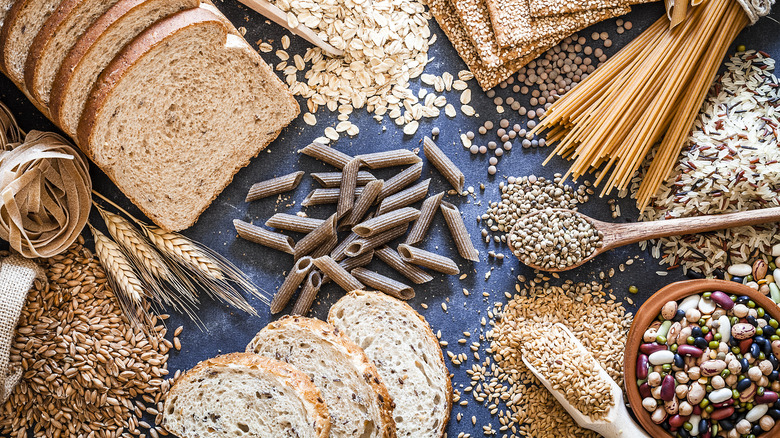
As you stroll past the bakery section of your favorite grocery store in the morning, the irresistible aroma of freshly baked bread is hard to miss. Even if you’re committed to a keto diet and avoiding carbs, the temptation to grab a fresh loaf of sourdough as a side for your favorite soup can be overwhelming.
Occasionally, a craving for bread can appear unexpectedly. You might be at your desk late in the day, suddenly imagining the texture of a warm piece of potato bread. Or perhaps you wake up in the middle of the night, longing for the dinner rolls from hours earlier. Cravings for foods like meat, sweets, chocolate, or bread could indicate a deficiency in essential nutrients. If you’re craving bread, it might suggest that your body’s serotonin levels are low, potentially due to a lack of tryptophan, an amino acid necessary for serotonin production (via Runtastic).
How carbs help release tryptophan

Your body’s response to food includes releasing insulin to manage the rise in blood glucose levels, which also affects the amino acids sent to the brain. High-protein meals prompt the body to send more leucine, isoleucine, and valine to the brain, potentially limiting tryptophan’s access. Consuming more carbohydrates facilitates tryptophan’s entry into the brain (via a 1986 article in Appetite).
Tryptophan is an essential amino acid that your diet must provide to support serotonin production. Serotonin, a neurotransmitter, plays a vital role in regulating mood, sleep, digestion, learning, and memory. Low serotonin levels can lead to anxiety or depression.
Although serotonin transmits messages from the brain to the rest of the body, the majority of it resides in your gut (via the Cleveland Clinic). Furthermore, sugar in foods can elevate serotonin levels, even if you’re craving bread.
Other ways to boost serotonin

Instead of reaching for another bun, there are alternative ways to boost serotonin levels. Increasing dietary tryptophan is one approach, and foods rich in tryptophan include milk, eggs, turkey, and cottage cheese (via Southwest Family Medicine). Incorporating more carbohydrates from vegetables, fruits, and whole grains rather than processed foods is another strategy. You can manage bread and carb cravings by adding more protein and healthy fats from nuts (via MedicineNet).
Additionally, non-dietary methods can elevate serotonin levels. Engaging in about 30 minutes of moderate exercise daily can boost serotonin. Since stress can lower serotonin levels, stress management techniques like meditation, yoga, or breathwork are beneficial. Aromatherapy, using essential oils such as lemon or bitter orange in a diffuser, can also enhance serotonin levels (via Southwest Family Medicine).




